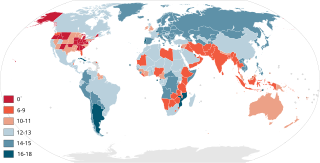
An assault is the act of inflicting physical harm or unwanted physical contact upon a person or, in some specific legal definitions, a threat or attempt to commit such an action. It is both a crime and a tort and, therefore, may result in criminal prosecution, civil liability, or both. Generally, the common law definition is the same in criminal and tort law.
Mens rea is the mental element of a person's intention to commit a crime; or knowledge that one's action or lack of action would cause a crime to be committed. It is considered a necessary element of many crimes.
Life imprisonment is any sentence of imprisonment for a crime under which convicted people are to remain in prison for the rest of their natural lives or indefinitely until pardoned, paroled, or otherwise commuted to a fixed term. Crimes for which, in some countries, a person could receive this sentence include murder, torture, terrorism, child abuse resulting in death, rape, espionage, treason, drug trafficking, drug possession, human trafficking, severe fraud and financial crimes, aggravated criminal damage, arson, kidnapping, burglary, and robbery, piracy, aircraft hijacking, and genocide, crimes against humanity, war crimes or any three felonies in case of three-strikes law. Life imprisonment can also be imposed, in certain countries, for traffic offences causing death. Life imprisonment is not used in all countries; Portugal was the first country to abolish life imprisonment, in 1885.

The age of criminal responsibility is the age below which a child is deemed incapable of having committed a criminal offence. In legal terms, it is referred to as a defence/defense of infancy, which is a form of defense known as an excuse so that defendants falling within the definition of an "infant" are excluded from criminal liability for their actions, if at the relevant time, they had not reached an age of criminal responsibility. After reaching the initial age, there may be levels of responsibility dictated by age and the type of offense committed.

Juvenile delinquency, also known as juvenile offending, is the act of participating in unlawful behavior as a minor or individual younger than the statutory age of majority. In the United States of America, a juvenile delinquent is a person who commits a crime and is under a specific age. Most states specify a juvenile delinquent as an individual under 18 years of age while a few states have set the maximum age slightly different. In 2021, Michigan, New York, and Vermont raised the maximum age to under 19, and Vermont law was updated again in 2022 to include individuals under the age of 20. Only three states, Georgia, Texas, and Wisconsin still appropriate the age of a juvenile delinquent as someone under the age of 17. While the maximum age in some US states has increased, Japan has lowered the juvenile delinquent age from under 20 to under 18. This change occurred on April 1, 2022 when the Japanese Diet activated a law lowering the age of minor status in the country. Just as there are differences in the maximum age of a juvenile delinquent, the minimum age for a child to be considered capable of delinquency or the age of criminal responsibility varies considerably between the states. Some states that impose a minimum age have made recent amendments to raise the minimum age, but most states remain ambiguous on the minimum age for a child to be determined a juvenile delinquent. In 2021, North Carolina changed the minimum age from 6 years old to 10 years old while Connecticut moved from 7 to 10 and New York made an adjustment from 7 to 12. In some states the minimum age depends on the seriousness of the crime committed. Juvenile delinquents or juvenile offenders commit crimes ranging from status offenses such as, truancy, violating a curfew or underage drinking and smoking to more serious offenses categorized as property crimes, violent crimes, sexual offenses, and cybercrimes.

The Children Act 1989 is a United Kingdom Act of Parliament which allocates duties to local authorities, courts, parents, and other agencies in the United Kingdom, to ensure children are safeguarded and their welfare is promoted. It centres on the idea that children are best cared for within their own families; however, it also makes provisions for instances when parents and families do not co-operate with statutory bodies.
Arrestable offence is a legal term now obsolete in English law and the legal system of Northern Ireland, but still used in the legal system of the Republic of Ireland. The Criminal Law Act 1967 introduced the category to replace the ancient term felony. That Act had been superseded by the Police and Criminal Evidence Act 1984, which over the next two decades was itself significantly amended to increase police powers of arrest, relating in particular to entry, search following arrest and to custody. In England and Wales, the category "arrestable offence" ceased to exist with the advent on 1 January 2006 of the Serious Organised Crime and Police Act. In Northern Ireland, it ceased to exist with the advent of the Police and Criminal Evidence (Amendment) Order 2007. In the Republic of Ireland, the Criminal Law Act 1997 abolished the terms felony and misdemeanour and created the term "arrestable offence" in their place.

A juvenile court is a tribunal having special authority to pass judgements for crimes that are committed by children who have not attained the age of majority. In most modern legal systems, children who commit a crime are treated differently from legal adults that have committed the same offense.

Child protection is the safeguarding of children from violence, exploitation, abuse, and neglect. Article 19 of the UN Convention on the Rights of the Child provides for the protection of children in and out of the home. One of the ways to ensure this is by giving them quality education, the fourth of the United Nations Sustainable Development Goals, in addition to other child protection systems.
Manslaughter is a common law legal term for homicide considered by law as less culpable than murder. The distinction between murder and manslaughter is sometimes said to have first been made by the ancient Athenian lawmaker Draco in the 7th century BC.

The Penal Code of Singapore sets out general principles of the criminal law of Singapore, as well as the elements and penalties of general criminal offences such as assault, criminal intimidation, mischief, grievous hurt, theft, extortion, sex crimes and cheating. The Penal Code does not define and list exhaustively all the criminal offences applicable in Singapore – a large number of these are created by other statutes such as the Arms Offences Act, Kidnapping Act, Misuse of Drugs Act and Vandalism Act.
Juvenile law pertains to those who are deemed to be below the age of majority, which varies by country and culture. Usually, minors are treated differently under the law. However, even minors may be prosecuted as adults.
Corporate manslaughter is a crime in several jurisdictions, including England and Wales and Hong Kong. It enables a corporation to be punished and censured for culpable conduct that leads to a person's death. This extends beyond any compensation that might be awarded in civil litigation or any criminal prosecution of an individual. The Corporate Manslaughter and Corporate Homicide Act 2007 came into effect in the UK on 6 April 2008. By the police and government admissions and evidence we see clear mass Genocide in Prisons Magistrates and solicitors and xyz disease waivers in most case law in common law books excluded blackstones novels not open to public highly illustrated illegally by Oxford.
Juvenile delinquency refers to crimes committed by children or young people, particularly those under the age of majority. In the United States, this means anyone under the age of eighteen.
The omissions of individuals are generally not criminalised in English criminal law, save in many instances of a taking on of a duty of care, having contractual responsibility or clearly negligent creation of a hazard. Many comparator jurisdictions put a general statutory duty on strangers to rescue – this is not so in English law. Defenders and reasoners of the position regard it as wrong for the criminal law to punish people in many circumstances for committing no physical act, which it is argued would be an infringement on human autonomy. Academics arguing for reform argue that a social responsibility to assist others should exist, particularly where there would be no danger to the rescuer.
Responsibility for criminal law and criminal justice in the United States is shared between the states and the federal government.
Sentencing in England and Wales refers to a bench of magistrates or district judge in a magistrate's court or a judge in the Crown Court passing sentence on a person found guilty of a criminal offence. In deciding the sentence, the court will take into account a number of factors: the type of offence and how serious it is, the timing of any plea of guilty, the defendant's character and antecedents, including his/her criminal record and the defendant's personal circumstances such as their financial circumstances in the case of a fine being imposed.
English law contains homicide offences – those acts involving the death of another person. For a crime to be considered homicide, it must take place after the victim's legally recognised birth, and before their legal death. There is also the usually uncontroversial requirement that the victim be under the "Queen's peace". The death must be causally linked to the actions of the defendant. Since the abolition of the year and a day rule, there is no maximum time period between any act being committed and the victim's death, so long as the former caused the latter.
Free-range parenting is the concept of raising children in the spirit of encouraging them to function independently and with limited parental supervision, in accordance of their age of development and with a reasonable acceptance of realistic personal risks. It is seen as the opposite of helicopter parenting. A notable text of the movement is Lenore Skenazy's book Free-Range Kids: Giving Our Children the Freedom We Had Without Going Nuts with Worry (2009).

The Ghanaian juvenile justice system encompasses the processes to handle minors who are in conflict with the law or who are in need of care and protection. The formal Ghanaian juvenile justice system was created under colonial rule and has evolved greatly since the early 1900s. Three stark changes for the system are throughout the colonial period, the beginnings of independence and the 1960 Criminal Procedure Code, and the newest Juvenile Justice Act.







